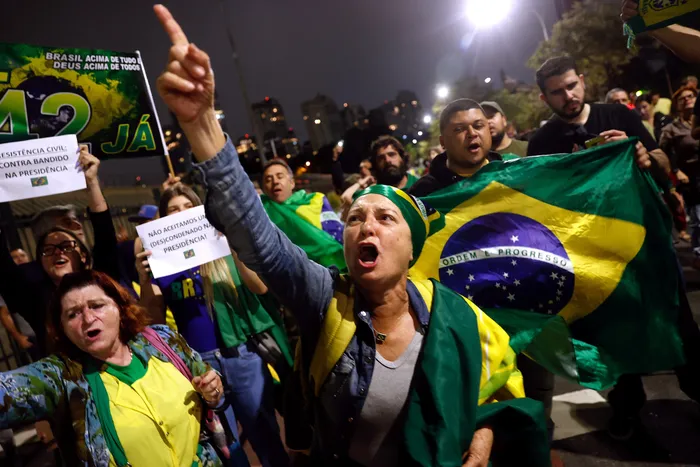Lula’s victory in Brazil: Hope for developing South Africa

Picture: EPA-EFE/Fernando Bizerra – Supporters of President Jair Bolsonaro protest for intervention by the armed forces outside of a military command facility after Luis Inacio Lula da Silva won the presidential election the day before, in Sao Paulo, Brazil, October 31, 2022.
Graphic: Timothy Alexander / African News Agency (ANA) – Incumbent President Jair Messias Bolsonaro managed to garner 49 percent of the vote. This signifies that national populism is still a potent force, the writer says.
By Ashraf Patel
Lula is back. It was twenty years ago in October 2002 to the month, that one Lula Ignacio de Silva, a metalworker and union leader become President of Brazil. After two attempts in the 1990s at the Presidency Lula finally accented on a broad-based working-class ticket. A decade plus of the ‘Lula moment’ saw mass expansion of social development, social cohesion, with huge poverty programmes that saw Brazil takings its place in Latin America and the community of nations.
However, this 2022 election is the closest in Brazil’s history. The vote also marks the first time that a sitting president has failed to win re-election. Just over two million votes separate the two candidates. Lula presides over a divided nation and has his work cut out.

Incumbent President Jair Messias Bolsonaro in his brash right-wing mode, launched multiple attacks on institutions, the wide scale abuse of social media that polarised the nation leading to public violence. Many organisations were subjected to a wave of state-sanctioned oppression from supporters of the new government. The disastrous mismanagement of the Covid crisis saw almost a million Brazilians dying, Together with Bolsonaro’s denial and mismanagement of Covid-19 saw the populations were disproportionately affected by the effects of the pandemic.
Yet Bolsonaro managed to garner 49 percent of the vote. This signifies that national populism is still a potent force. A Lula administration needs to address boosting economic growth and rebuilding institutions – and being an inclusive president.
Lula would be cognisant that any economic downturn – such as the 2012 one – would once again open the door for the privileged classes to shore up support across the social and economic spectrum, opening the doors to populism, lawfare and social media storms and disinformation that can reverse this democratic gains.
The close election result shows deep divisions in Brazil society, riven along class, race and regional and religious evangelical lines. The election victory may also mean that Lula will of necessity be prudent and tread carefully with his reform agenda. Some have criticised Lula for ‘mainstreaming his policies ’to appease the power structure”.
Significantly, Lula’s victory also comes atop a new ‘left red tide’ sweeping Latin America. The victory of left parties in Chile under young Gidon Boric, as well as Colombia’s Gustvo Petric and Francia Marquez, Colombia’s first black vice president. Together with Ámlo Obrodors Mexico, a solid and strong left social democratic momentum is taking root in Latin America.

This model is most appealing and relevant in a post Covid world where strong developmental states are required to meet a myriad of social development goals and ensure inclusive and redistributive policies, while addressing the multiple climate change crises and migration flows within a human rights centred framework. This Latin American model can be the one a post pandemic world so desperately needs.
At a geo-political level, Lula’s victory is also a boost for BRICS, and the broadly the Developing south, as well as Africa. A post Covid global economy in the doldrums requires much needed multilateral reforms at the UN and G20, especially regarding developing finance, infrastructure, access to IP and technology transfer especially regarding pandemics and climate technologies. Also significant is that most global leaders have warmly congratulated Lula, from all the BRICS nations as well as US President Biden. In this milieu Lula, an advocate for multilateralism is a welcome boost, and can even be a mediating force and voice in a world raptured by complex geo-political schisms.
A Lula administration is also bound to revive the historical solidarity with many nations in the Global south – Cuba, Palestine and South Africa. Lula is likely to revive the Afro-Brazil relations that characterised his term of office seeing better solidarity partnerships rooted in social justice Revived discussions on slavery and need for reparations at the UN level could be again on the agenda.
Another ray of light and hope in a Lula’s presence would welcomed in global for a such as the UN CoP 27 where a fair deal for a Just transition is required, one that recognised the rights and level of development of ‘differing responsibilities’ for developing nations.
By committing to protect the Amazon – the lung of the world – and halt the rampant deforestation and mining that were so rife under the Bolsonaro administration, Lula and the PT Workers’ Party have won significant global admiration.
Finally, Lula is a born fighter – for the working class, the poor and a visionary for a socially just society and world order. His complex journey- from worker to union leader – to president, to prisoner- and again president is one of heroic proportions. In a world fractured by race, class, cultural-religious divisions, and the post pandemic climate crises, Lula’s da Silva’s victory this week is refreshing for Brazilians, for Latin Americans and the World.
Patel is a development and public policy analyst and researcher at the Institute for Global Dialogue.
This article was exclusively written for The African. To republish, see terms and conditions.